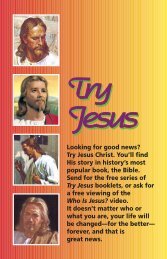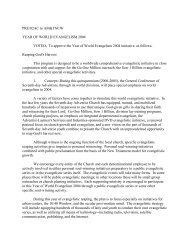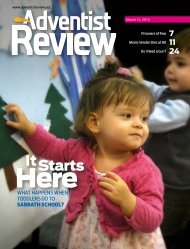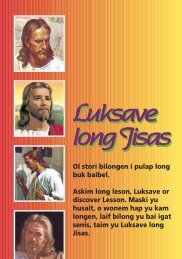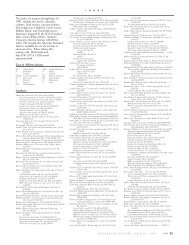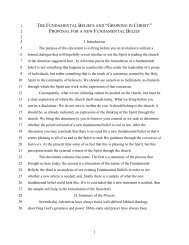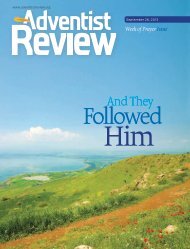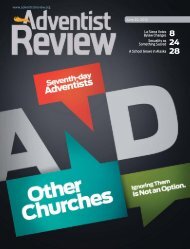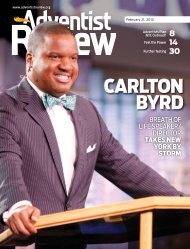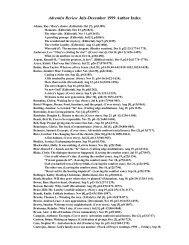Download PDF - Adventist Review
Download PDF - Adventist Review
Download PDF - Adventist Review
- No tags were found...
You also want an ePaper? Increase the reach of your titles
YUMPU automatically turns print PDFs into web optimized ePapers that Google loves.
Certitude<br />
“Help my unbelief!” the father of a<br />
tortured boy once pleaded with Jesus<br />
(Mark 9:24), and in so doing voiced the<br />
heart cry of so many.<br />
An old cynicism reminds us that we<br />
can truly be certain of only two things in<br />
this life—death and taxes—and loss is<br />
the common denominator of both. We<br />
lose health and vigor to age or illness;<br />
we lose those we love to cancer,<br />
heart attack, or stroke; we lose savings<br />
to once-wise investments now<br />
gone south; we watch paychecks<br />
shrink to fund an ever-growing government.<br />
We can be certain, we say,<br />
only of the negatives—that we can<br />
never win, that we can never gain, that<br />
we can never get ahead.<br />
The pace at which we usually live our<br />
lives also seems perversely calculated to<br />
keep us doubtful and uncertain. We race<br />
through relationships, trying to extract<br />
what joy we can, and wondering why<br />
they offer us no deep, abiding sense of<br />
well-being and groundedness. We flit<br />
through our devotional time—all wings<br />
and color—and wonder why we get so<br />
little from it. Even the Sabbath, God’s<br />
weekly symbol of deep rest and sweet<br />
assurance, becomes for some a lengthy<br />
irritant. “When will the Sabbath be over,<br />
so we can buy and sell?” we ask repeatedly<br />
of the clock (see Amos 8:5).<br />
But Jesus came to free us from the tyranny<br />
of things we can’t be sure of. “And<br />
you shall know the truth, and the truth<br />
shall make you free” (John 8:32), He<br />
said, underlining the essential connection<br />
between His Word and the sense of<br />
deep security He intends His followers<br />
to know. Certitude is the fortunate experience<br />
of being sure of the most essential<br />
truths—truths that change and<br />
shape our everyday experiences.<br />
In place of our<br />
question marks,<br />
Jesus offers His<br />
declarations.<br />
So much of what we have come to<br />
think of as “normal” in the Christian<br />
journey—periodic anxiety, at least occasional<br />
doubt, and restlessness—was<br />
never in His plan for His disciples, then<br />
or now. He intended that His Word convey<br />
to us the blessed certainties of existence—that<br />
God is love (1 John 4:8); that<br />
we are loved (1 John 4:16); that we can<br />
learn to love as God does (1 John 4:21).<br />
In place of our question marks, Jesus<br />
offers His declarations: “My peace I give<br />
to you,” He assured His closest friends,<br />
“not as the world gives do I give to you”<br />
(John 14:27). “I have come that they may<br />
have life, and that they may have it more<br />
abundantly” (John 10:10), He promises.<br />
Choicest among the good things He<br />
offers us is the gift of discovering that<br />
we are deeply loved—before we are ever<br />
sorry for our sins; before we ever repent<br />
and reform; before we ever become useful<br />
to His kingdom (Rom. 5:8). It is only<br />
His estimate of our worth that makes<br />
us begin to believe that we are truly<br />
valuable, and that our lives have meaning<br />
beyond what we can get or achieve.<br />
When we learn that His love for us is<br />
so deep and vast and different that He<br />
laid down His life for those He prophesies<br />
will be His “friends” (John 15:15),<br />
we discover a new certainty we have<br />
never previously known. Nothing we<br />
have ever experienced in this life and<br />
nothing we can imagine in death can<br />
ever separate us from a love so broad<br />
and vast and deep (Rom. 8:38, 39). Even<br />
death, the greatest threat to human certitude,<br />
gives up its prizes on that day<br />
when it “is swallowed up in victory”<br />
(1 Cor. 15:54).<br />
Certitude, then, is more than simple<br />
optimism or righteous wishful thinking.<br />
Certitude is the habit of the heart in<br />
which we trust that what God says<br />
about us is always more true than anything<br />
we can say about ourselves. When<br />
His Word tells us that we are great sinners,<br />
we accept His Word by faith,<br />
even when we don’t feel ourselves to<br />
be so very sinful (see Ps. 139:23, 24).<br />
And when, having confessed and<br />
forsaken our sins according to His<br />
Word (1 John 1:9), we still feel condemned<br />
and guilt-ridden, we place<br />
our weight upon the righteousness that<br />
His Word says has actually been<br />
imputed to us: “And by this we know<br />
that we are of the truth, and shall assure<br />
our hearts before Him. For if our heart<br />
condemns us, God is greater than our<br />
heart, and knows all things” (1 John<br />
3:19, 20).<br />
Ellen White echoes this great truth in<br />
words we ought to frame for every wall:<br />
“We need a more firm reliance upon a<br />
‘Thus saith the Lord.’ If we have this, we<br />
shall not trust to feeling, and be ruled<br />
by feeling. God asks us to rest in His<br />
love. It is our privilege to know the<br />
22 (838) | www.<strong>Adventist</strong><strong>Review</strong>.org | September 19, 2013



